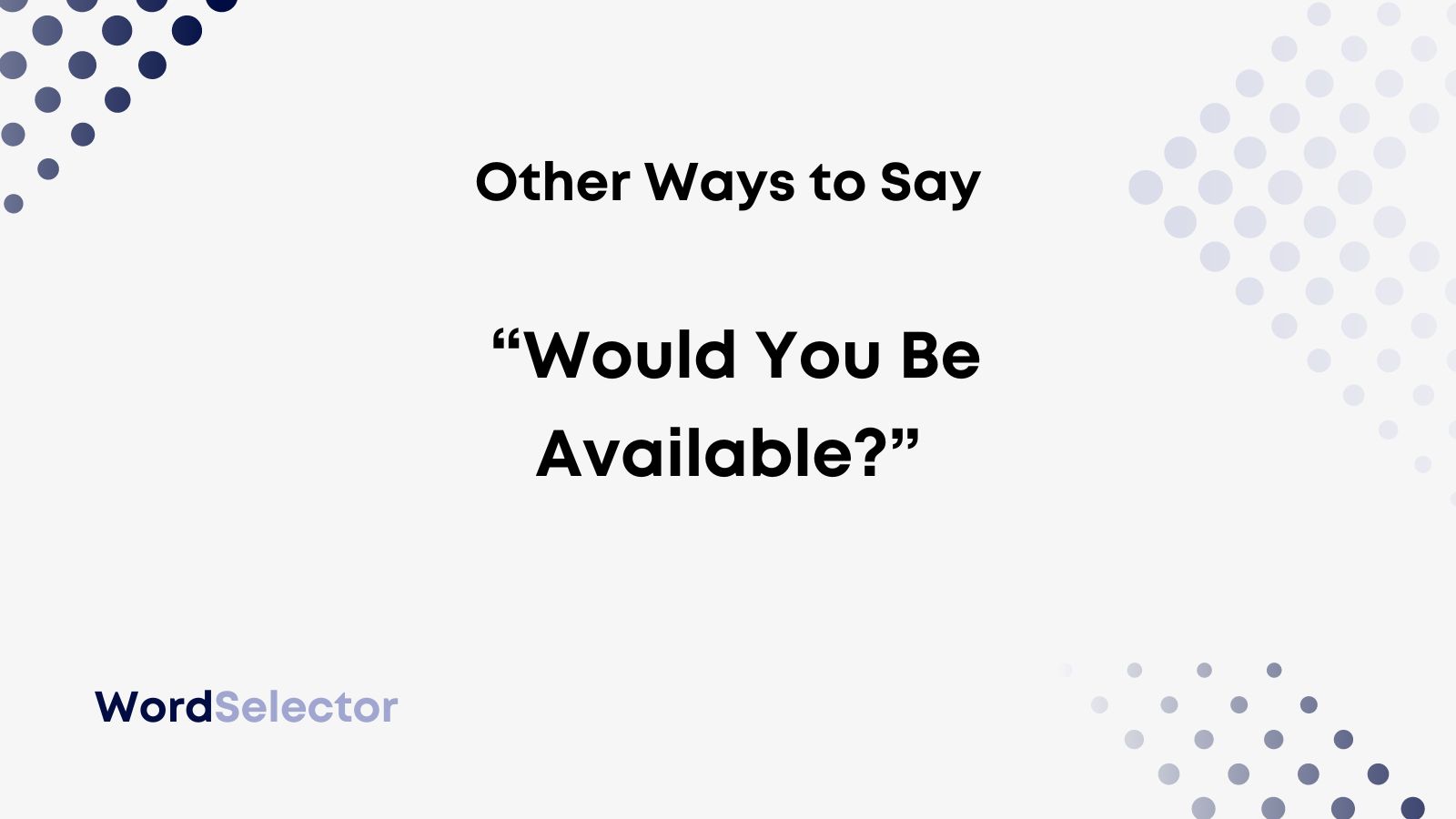Are you checking someone’s availability with “would you be available?” Perhaps you’re worried it might not be the best phrase to use.
This article will explain how to say it professionally and politely. We’ve gathered the best synonyms to help you mix things up.
Other Ways to Ask “Would You Be Available?”
- Let me know what time works for you
- Are you free?
- When can we get this done?
- Do you have the availability?
- When works?
- When can you do it?
- I still need to know what time is best
- Please tell me when you can do
- Is there a specific time that works best?
- What time works for you?
- I’m available whenever you are
- I’m happy to go by your availability
KEY TAKEAWAYS
- “Would you be available?” is correct and useful in formal contexts when setting up meetings.
- “Let me know what time works for you” is a great professional alternative.
- You could ask “are you free?” in informal contexts when learning about someone’s schedule.
You should read on to learn more about the best synonyms for “would you be available?” We’ve covered the best formal and informal options to help you.
The final section also touches more on “would you be available?” If you’d like to learn more about the question, the last section is the place to be.
Let Me Know What Time Works for You (Formal)
“Let me know what time works for you” is a great professional alternative. It shows you want the recipient to give you a time based on when they are free to do something.
You should use this phrase when emailing employees and trying to arrange a meeting. It suggests that you need people to agree on a time, so you want to present the idea to them before you settle on anything specific.
It’s always smart to let other people decide what time works for them. That way, you’ll ensure that the majority can attend without having to rearrange anything.
We recommend using “let me know what time works for you” and “would you be available?” in formal contexts. They are both useful, allowing you to mix things up between emails.
The email example below should help you understand it:
Dear Damian,
Let me know what time works for you for the meeting on Sunday. I still want you to be there to hear what they say.
Yours,
Paola
Are You Free? (Informal)
“Are you free?” is an excellent informal question. You can use it to find out whether someone is free to do something with you. It’s much simpler than most of the formal choices.
For instance, you might want to set up an event with a colleague or plan a meal with a friend. Either way, you should use “are you free?” to figure out whether they can come along and do it with you at a specific time.
Generally, “are you free?” isn’t the end of the question. You can add more to the question to be more specific. For example:
Are you free on Friday?
Are you free to help?
You can use “are you free?” formally as well, though it’s not quite as effective as “would you be available?” It does not sound professional, so it’s better in conversational situations.
Here are a few examples that should help you:
Hey Betina,
Are you free for a chat later this week? I’m still hoping we can arrange some plans for the upcoming event.
All the best,
Homer
Are you free to talk now, though? I have a few things I’d like to say, but I don’t want to waste your time.
Is It Correct to Say “Would You Be Available?”
“Would you be available?” is correct. You can ask it when you want to find out more about someone’s schedule. It shows you are looking for some ways to plan meetings or events with them.
There are a few different verb choices that might impact the phrase. They are as follows:
- Would you be available?
- Will you be available?
- Are you available?
“Would” suggests you would like to know someone’s schedule to sort plans out. If they aren’t available, you may be able to reschedule.
“Will” suggests that you cannot reschedule the plans. The person is either free or not to do something on the suggested day.
“Are” is synonymous with “will.” It suggests you have already selected a time and need someone to be available for it.
“Would” is the most open choice. It gives you an opportunity to plan better to ensure that someone doesn’t miss your plans.
You may also use one of the following variations:
- Would you be available for a meeting today?
- Would you be available for a call tomorrow?
- Or would you be available for a call next week?
- Would you be available for an interview?
These generally allow you to be more specific about what you need someone to be available for.
Also, you could try to rephrase the question. Starting the question with “what” or “when” allows you to find out a time that works for someone else. For instance:
- What time would you be available tomorrow?
- When would you be available for a meeting?
Feel free to bookmark this page to remind yourself of the alternatives for “would you be available?” You never know when they might come in handy again.

